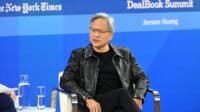
In a joint press release Tuesday, Amazon.com Inc. (NASDAQ: AMZN) and BlackBerry Ltd. (NYSE: BB) announced a multiyear agreement to develop and market a cloud-connected software platform for automobiles. The move is just the latest by both companies to firm up their positions in the self-driving vehicle space.
In June of this year, Amazon acquired Zoox, a startup working on self-driving taxis. The acquisition reportedly cost Amazon about $1.4 billion, including a $100 million stock option plan to keep Zoox employees on board.
[in-text-ad]
In 2019, Amazon participated in a Series B funding round of $530 million for self-driving minivan startup Aurora Innovation. Just last month, Aurora was reportedly in discussions with Uber Technologies Inc. (NYSE: UBER) to acquire Uber’s advanced technologies group (Uber ATG), the ride-hailing company’s division working on self-driving vehicles.
Amazon’s interest in all things robotic is seemingly insatiable. While the company hired something like 400,000 seasonal workers to get it through the pandemic and the 2020 holiday season, Bezos and company have invested heavily in robotics, including a 2012 acquisition of Kiva Systems (now Amazon Robotics) for $775 million. The AP reported last December that Amazon had more than 200,000 warehouse robots moving goods through its fulfillment centers in the United States.
For Amazon, robotics and autonomous vehicles offer both savings in the company’s primary business and an opportunity for Amazon Web Services (AWS) to expand into the management of in-vehicle systems like BlackBerry’s IVY intelligent vehicle platform, “a scalable, cloud-connected software platform that carmakers can use to consistently and securely “read vehicle sensor data, normalize it, and create actionable insights” both in the vehicle itself and in the cloud.
The IVY software continues a push begun in 2010 when Research in Motion (the company that made BlackBerry phones) acquired QNX Software, an embedded microkernel-based operating system, from Harman International, maker of Harman Kardon audio systems, among other products.
In an effort to meet the onslaught of smartphones from Apple, Samsung and others, BlackBerry built a new operating system for its Blackberry 10 based on QNX. The company licensed QNX to companies as diverse as Cisco Systems, General Electric and Caterpillar, all of which were developing or had developed machine-to-machine applications on the platform.
By 2014, BlackBerry’s QNX had garnered more than half of the market for automobile infotainment systems and was used by Ford, Mercedes-Benz, Audi and BMW. Apple’s CarPlay and Google’s Android Auto also use QNX as middleware that separates a vehicle’s own systems for things like the rear-view camera from the entertainment systems. According to BlackBerry, the company’s software is used currently on some 175 million cars.
According to Tuesday’s announcement, BlackBerry’s IVY platform will run on a vehicle’s embedded systems but be managed and configured remotely from the AWS cloud. The result is a system that would allow automakers “to deliver new features, functionality, and performance to customers over the lifetime of their cloud-connected vehicles, as well as unlock new revenue streams and business models built on vehicle data.”
What BlackBerry gets out of this deal is a cloud management system that puts its IVY system on an equal footing with the capabilities of the software system Tesla uses to update and upgrade its vehicles. AWS gives BlackBerry the computing horsepower and market breadth it needs to grow its IVY platform as the auto industry inches its way toward fully autonomous vehicles. It’s a big deal for the former cell phone maker.
BlackBerry stock traded up as much as 65% on Monday to post a new 52-week high of $9.69. The 52-week low is $2.70, and the consensus price target on the stock is $5.71. It closed at $7.00 a share, and in Tuesday’s premarket, shares traded up 15% at around $8.04.
Thank you for reading! Have some feedback for us?
Contact the 24/7 Wall St. editorial team.

 24/7 Wall St.
24/7 Wall St.



